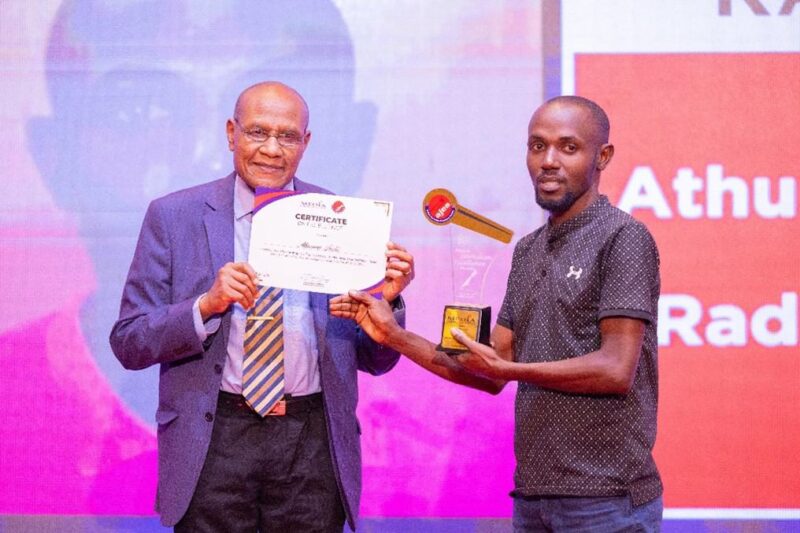Story by Jackline Lidubwi, Internews Africa Project Lead
Internews Disability Reporting fellows scooped various awards in the 2022 Annual Journalism Excellence Awards (AJEA). The 2022 awards sponsored by the Media Council of Kenya, saw Internews trained journalists bag awards on disability reporting on the radio platform which has a wide reach in Kenya.
Athumani Luchi emerged overall winner in the Mental Health and Wellness category. His story about how people with mental health conditions are saved from the streets of Mombasa, was the winning piece. The story which was told in two parts highlighted how over 100 people with intellectual disabilities were treated, rehabilitated and taken back to their families after recovery. Some of them got married after rehabilitation while others were engaged in gainful activities in construction and businesses.
Speaking after winning the award, Athumani Luchi said, “The disability reporting training by Internews helped me to know how to come up with disability story ideas and also how to use the correct terminologies while writing a story of persons with disabilities.”

Ruth Keah of Radio Rahma won in the ICT and Telecommunication category. Her winning piece revealed untold challenges that people who stammer face while using digital technologies such as mobile phones. They incur extra expenses while communicating over mobile phones because of the longer time they take to articulate their messages, unlike people without speech fluency issues. In a country where people with disabilities face higher unemployment rates, the extra communication charges are an additional barrier for people who stammer.
Ruth was also a runner-up in two other categories, which included sports, and innovation and business. Her piece in the sports Category featured Mohammed Munga, a 28 years old boy who is an amputee, who defied all odds to excel in amputee football. The story traced Munga’s journey from playing football in the village to becoming a professional amputee footballer in Turkey. Munga, who comes from Kilifi County, is now the breadwinner for his family.
Ruth’s story in the Innovation and Business Reporting Category was singled out by the judges because it showcased how mobile apps could be used to increase the employment of people with disabilities (PWDs). In a society where most employers shy away from absorbing people with disabilities, connecting PWDs with employment opportunities is critical. The story highlighted how the Riziki Source App connected people with disability with employers. The app allows PWDs to upload their CVs which are then made accessible to potential employers. In this way, the app ensures that people with disabilities are not left behind in employment.

“I am humbled to receive these awards,” said Ruth Keah. “I produced the three stories after attending the three days training on disability reporting hosted by Internews in Nairobi. The training opened my mind to the various story angles I could pursue when reporting on disability. The training and mentorship I received from Jackline Lidubwi helped me to craft the winning stories. I thank Internews for impacting me with practical skills and knowledge to produce high-quality award-winning stories,” she added.
The Annual Journalism Excellence Awards celebrates journalistic excellence and achievements in Kenya. The prestigious awards were initiated in 2012 to honor journalists in print, broadcast, and digital platforms. Over its 10-year history, AJEA has consistently demonstrated its commitment to shining light on critical issues that shape Kenyan society.
Inclusive Media is a two-year project supporting and empowering journalists in key countries in Sub-Saharan Africa to increase and improve their coverage of disability issues, presenting disability issues in a way that promotes the dignity of PWD as well as amplifying their own voices and perspectives.
